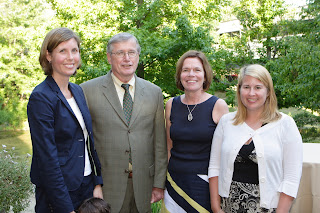Although said casually in passing during last year’s
Interdisciplinary Nursing Quality Research Initiative (INQRI) national conference,
that statement sums up something key about this program.
We have never been interested in business as usual.
The Robert Wood Johnson Foundation launched the INQRI
program in 2005 to generate, disseminate, and translate research to understand
how nurses contribute to and can improve the quality of patient care. As the
INQRI leadership team, we strongly supported this goal, but we knew that we
needed to adopt a new approach to nursing research. In our initial strategy sessions, we realized
that INQRI would demand that its grantees think outside the box and collaborate
in new ways. We required that all our
teams be co-led by a scholar from nursing and one from outside of nursing. We knew that an interdisciplinary focus would
be challenging to researchers who were accustomed to staying within their
comfort zones, but that the potential risks would be worth the rewards.
 |
| Lori Melichar, Mark Pauly, Mary Naylor, Heather Kelley |
Over the course of the program, INQRI has funded 40
interdisciplinary teams to produce evidence that better nursing improves
quality of care by reducing medical errors and identifying measures, processes
and protocols that help health systems and health professionals ensure the best
patient outcomes possible. We have heard time and again from these teams that
without the “push” from us to work in collaboration with new partners, it is
unlikely that researchers would have reached out to scholars from other
disciplines. Some of the nurse
investigators told us that without INQRI asking, “well, why not?” they never
would have submitted papers about nursing for publication in the Journal of the American Medical Association
or Health Services Research. Perhaps most gratifying, we’ve heard team
members say time and time again that INQRI has convinced them to always pursue
future projects with an interdisciplinary team in place.
We are proud of our teams’ efforts and we continue to support the promotion of their work, but we also knew that at our national conference in April 2012, we again would not be pursuing business as usual. We were not interested in an event where individual team members reported their findings. Instead, we issued a new challenge. A select group of INQRI grantees were asked to use their findings as the basis for discussions about: the relationship between their research and trends in interdisciplinary collaboration; methodology and implementation science; quality measurement; dissemination and implementation; and the business case for nursing. We encouraged these scholars to write papers which, in addition to summarizing previous results and presenting new ones, provided additional insights into the implications of their results for health policy, for the fields of quality measurement and quality improvement, and for translation sciences. In keeping with the collaborative nature of the INQRI program, the selected grantees developed the papers in partnership with other INQRI research teams across a mix of disciplines. These papers were developed for inclusion in a special supplement of Medical Care and were presented for feedback during the conference.
Last April, we were joined not only by INQRI grantees from
all years of the program, but also by RWJF leaders, our National Advisory
Committee members, stakeholders from a range of disciplines, students new to
the field, and more. We were thrilled to
hear about the wonderful experiences our grantees had over the course of the
program and truly gratified to learn from our invited guests that they had
developed a strong appreciation for the work of our teams. There was a buzz in the air as new
collaborations formed, new projects were planned, and memories were shared.
Now, we want to continue that feeling of excitement with the
publication of that long-planned special supplement. This week, we are hosting a blog carnival
which will provide more information about the supplement as well as the program
itself. Watch this space for exciting
updates, videos, and more. In the
meantime, be sure to visit www.inqri.org
and the Medical Care site to access
the supplement.
As we pause this week to acknowledge the tremendous
accomplishments of our grantee teams, we also recognize the need for continued
exploration of the field. We wanted to
demonstrate that there is a causal link between nursing and quality and we feel
confident that INQRI research has done that.
But, we also recognize that there is work ahead. Future endeavors must focus on efforts that
have fiscal feasibility, which can be sustained over time. We must not neglect the business case for
quality to truly have an impact on the delivery of care. So, please join us in celebrating this week…
and in thinking about how to accomplish all that lies ahead. Onward!
Mary Naylor, Program Director
Mark Pauly, Program Co-Director
Lori Melichar, Senior Program Officer
Heather Kelley, Program Associate
This post is part of our week-long blog carnival focused on the Medical Care supplement. Click here to access all posts in this carnival.
This post is part of our week-long blog carnival focused on the Medical Care supplement. Click here to access all posts in this carnival.

No comments:
Post a Comment